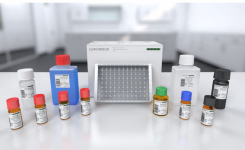CE Marking for PLEX-ID Molecular System and Tests for Broad Microbial ID
go back to news archives| Abbott has obtained CE Marking to market its rapid, high-throughput PLEX-ID™ instrument, along with three assays for use on the system: PLEX-ID Viral IC Spectrum, PLEX-ID BAC Spectrum BC and PLEX-ID Flu. PLEX-ID, which is based on molecular diagnostic technologies, addresses a significant unmet need for rapid detection and identification of a broad range of microbes that cause infections in patients. It provides results in less than eight hours instead of the days or even weeks required for traditional culture methods. The unique advantage of the system is the ability to characterize a very wide range of microorganisms directly from clinical specimens, thus minimizing both the amount of time and laboratory work required to provide physicians important information they can use to best tailor treatment for the patient. 'Ensuring that patients receive the most appropriate antimicrobial therapy as rapidly as possible has the potential to reduce inappropriate antibiotic prescribing, and help to reduce or slow the development of resistant bacterial strains,' said Jacques Schrenzel, M.D., head of the Bacteriological Laboratory, University Hospital Geneva in Geneva, Switzerland. 'PLEX-ID is the only available diagnostic technology that is capable of identifying a wide range of bacteria, viruses, fungi, and certain parasites in hours,' said Murthy Simhambhatla, Ph.D., head of Abbott´s Ibis Biosciences business. 'The introduction of the PLEX-ID provides physicians and laboratorians a revolutionary new platform for the rapid etiologic identification of a wide variety of pathogens in patients.' Assays to Rapidly Identify Pathogens in Seriously Ill Patients Research presented in several global scientific venues has shown that the PLEX-ID technology offers rapid detection and characterization of a wide range of pathogens, which can be extremely important in patients who have an impaired immune system such as those with cancer or patients who have had a transplant. The PLEX-ID Viral IC Spectrum assay is designed to detect and identify 11 viral families with more than 250 species of important systemic viral pathogens, including herpes simplex virus (HSV), cytomegalovirus (CMV), Epstein-Barr virus (EBV), human adenovirus, human enterovirus, BK and JC polyomaviruses, and parvovirus B19, directly from plasma specimens. These viruses represent a significant threat to vulnerable patients with weakened immune systems. Systemic viral infections are a serious problem, occurring in one out of every six transplant patients. Earlier detection can enable physicians to act more quickly to manage the patient´s infection. The PLEX-ID BAC Spectrum BC assay can detect and identify nearly 400 species of bacteria, and also can detect the presence of genetic markers that determine bacterial resistance to certain antibiotics. In addition, the test can identify and classify species of Candida, a fungus that is an increasingly common cause of serious systemic infections. The assay performs this analysis on blood culture positive specimens. Abbott plans to introduce a modified version of the assay in Europe later this year which is designed to analyze the blood sample immediately after it reaches the lab rather than having to first wait for the organism to grow in culture. The PLEX-ID Flu assay is intended for detection and identification of known influenza A viruses, newly emerging influenza A strains, and influenza B. |
NOTE: This item is from our 'historic' database and
may contain information which is not up to date.
Source : Abbott GmbH & Co. KG [Germany] View archived contact details
Is a subsidiary/distributor for
Abbott Laboratories, USA View Company Information
Posted on April 3, 2012
















